Women's Agency for Generating Employment (WAGE)
Information Disseminated Through Walkipedia
Philosophy and Origins
The Women's Agency for Generating Employment (WAGE) was established on the occasion of the International Women's Day on 8th March 1990 and was inaugurated by the then Minister-in-Charge of Women and Child Development, Government of India Smt. Usha Sinha on 5th June 1990 in the Auditorium of India International Centre, 40 Lodi Estate, New Delhi in the presence of more than 200 women representatives from all over the world.
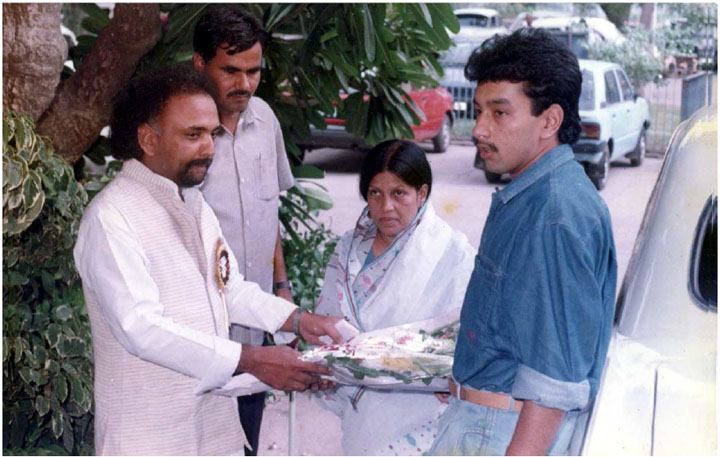
5 June 1990 : The Union Deputy Minister in charge of Women and
Child Development, Government of India, Hon'ble Smt. Usha Sinha,
being welcomed at India International Centre, New Delhi on the
occasion of the inauguration of "Women's Agency for Generating
Employment (WAGE)".
The idea behind establishing WAGE is to generate employment among women with a view to empower them in all aspects also by providing them necessary and required training support for ensuring that they become job givers rather than job seekers by becoming entrepreneurial leaders.
Between 1990 and 2016, many researches have been conducted in different areas relating to women's development and empowerment. Accordingly many publications have been brought out in the form of occasional monographs and case books.
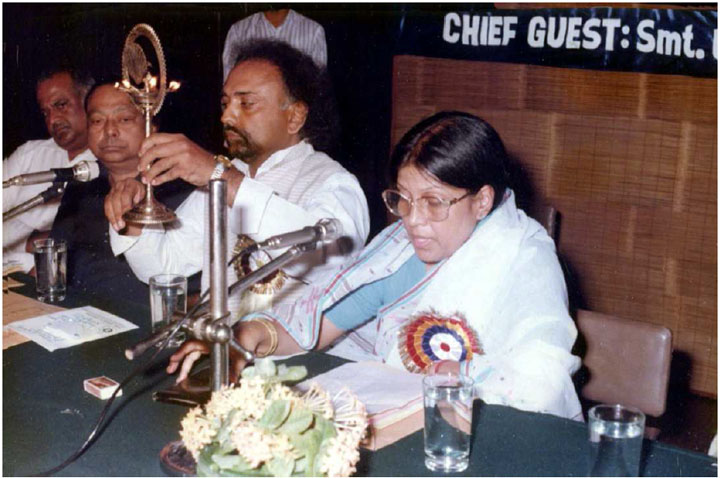
5 June 1990 : The Union Deputy Minister in charge of Women and
Child Development, Government of India, Hon'ble Smt. Usha Sinha,
delivering her inaugural speech at India International Centre,
New Delhi on the occasion of the inauguration of
"Women's Agency for Generating Employment (WAGE)".
The Women's Agency for Generating Employment (WAGE) is all out to translate the wishes of the Government of India into action by implementing the action programmes announced by the Hon'ble Prime Minister Shri Narendra Modi regarding Beti Bachao, Beti Padao, Women's Empowerment, Clean and Green India, Skilling the Girl Child etc. by organizing training, research and publications activities besides conference organizations for ensuring social, cultural, environmental, scientific, technological, economic and positive development of women.
The following national and international level conferences have been organized by WAGE in association with the Confederation of Indian Universities (CIU), Indian Institute of Ecology and Environment (IIEE), and National Institute of Cleanliness Education and Research (NICER).
On 5 and 6 June 2017, WAGE in collaboration with NICER organized the World Clean Environment Summit 2017 at India International Centre, 40 Lodi Estate, New Delhi where the Chief Guest was Hon'ble Prof. Kaptan Singh Solanki.
The idea behind organizing this Summit was to involve young boys and girls in promoting Clean Up The Earth (CUTE) in general and Cleaning India in particular.
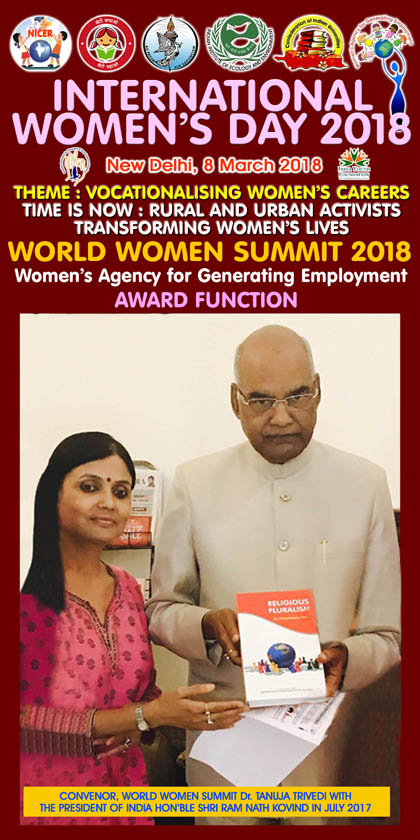
Convenor, World Women Summit 2018 Dr. Tanuja
Trivedi with
the President of India Hon'ble Shri Ram Nath Kovind in July
2017.
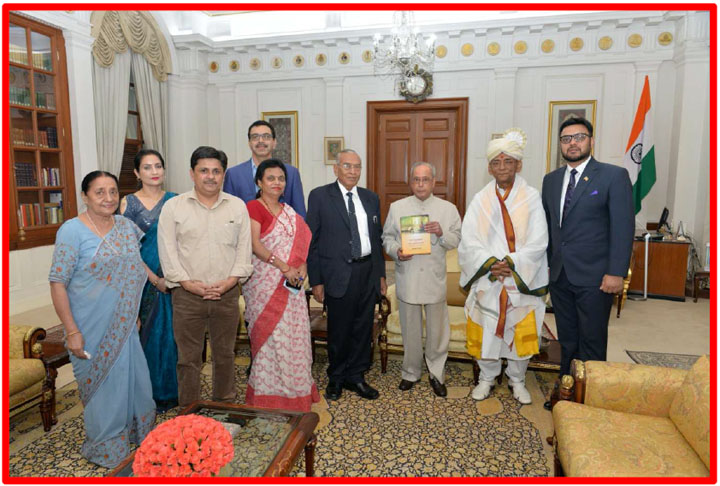
The Team Members of the Women's Agency for Generating Employment
(WAGE) meeting the President of India Hon'ble Shri Pranab
Mukherjee
on 6 June 2017 for presenting their publications related to
Upanishads at Rashtrapati Bhawan.
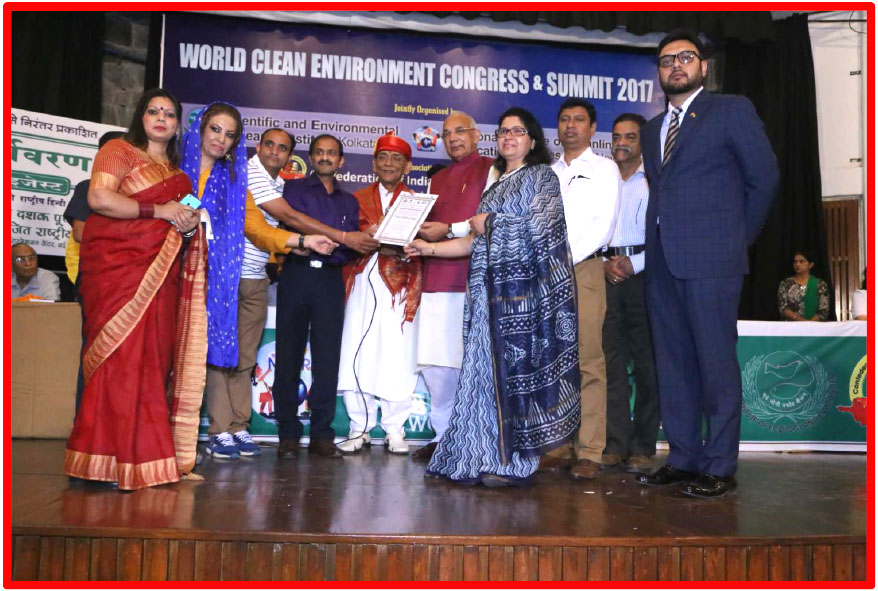
Hon'ble Prof. Kaptan Singh
Solanki, Governor of Haryana participating in the felicitation
of young women for their contribution in the areas of
cleanliness,
hygiene and sanitation on 5 June 2017 at New Delhi.
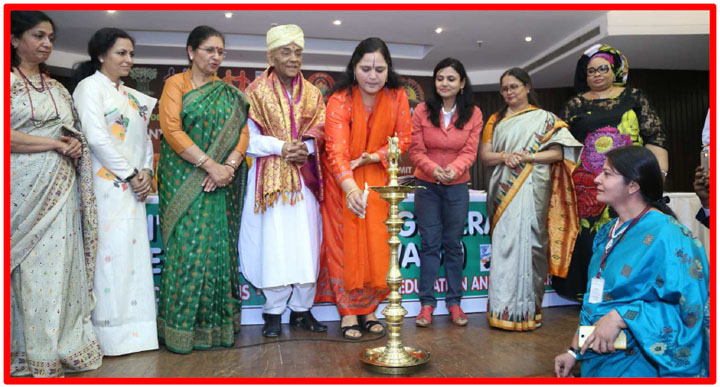
Her Holiness Anandmurti Guru Maa lighting the lamp marking the
success of
Girl Child Summitand the Release of the 50 Volume World Encyclopaedia of
Women's Development on 8 March 2017.

The High Commissioner of Botswana H.E. Ms. Lesego Ethel Motsumi,
the High Commissioner of Zambia H.E. Mrs. Judith
Kan'goma-Kapijimpanga
and the High Commissioner of Nigeria H.E. Mrs. Queen Imaria with
H.H. Anandmurti Guru Maa during CIU sponsored Session
on Afro-Asian Higher Education Agglomeration for Development
(AHEAD) on 8/3/2017.
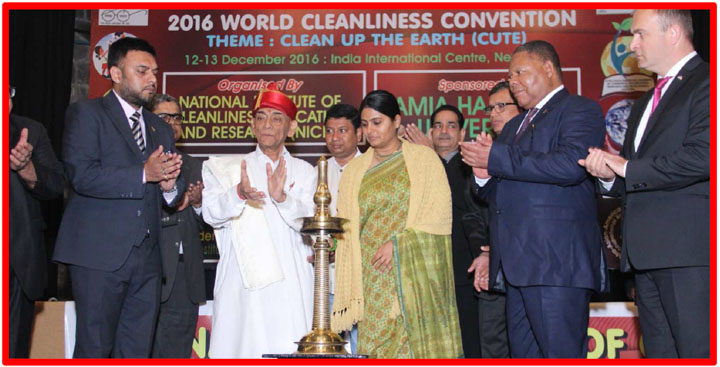
The Union Minister of
State for Health and Family Welfare Ms. Anupriya Patel
inaugurating the World Cleanliness Convention 2016 jointly
organized by WAGE, CIU and NICER.
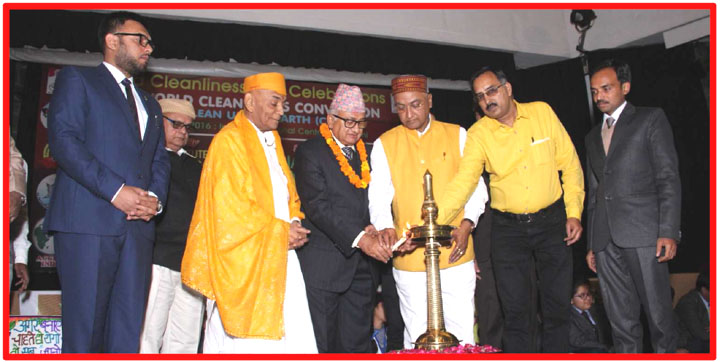
The Ambassador of Nepal H.E. Deep Kumar Upadhayaya lighting the lamp to mark the Cooperation on Vocational Education and Research envisaged by WAGE.
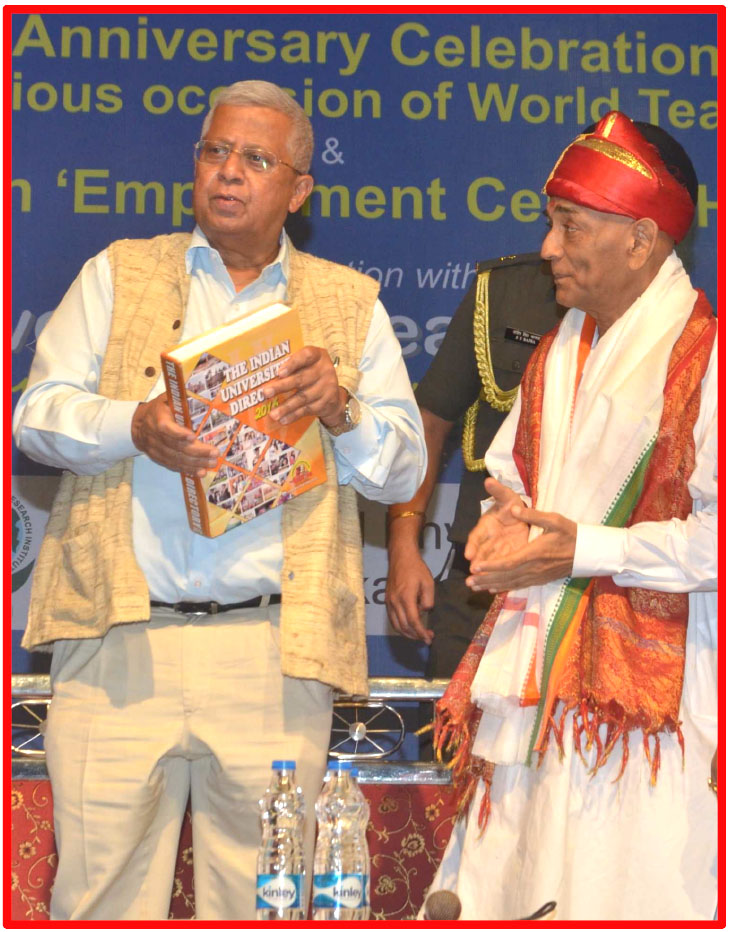
The Governor of Tripura Hon'ble Prof. Tathagata Roy releasing
the Indian Universities Directory 2016 at Kolkata during
the World Teachers Day Function organized by WAGE
on 5 October 2016.
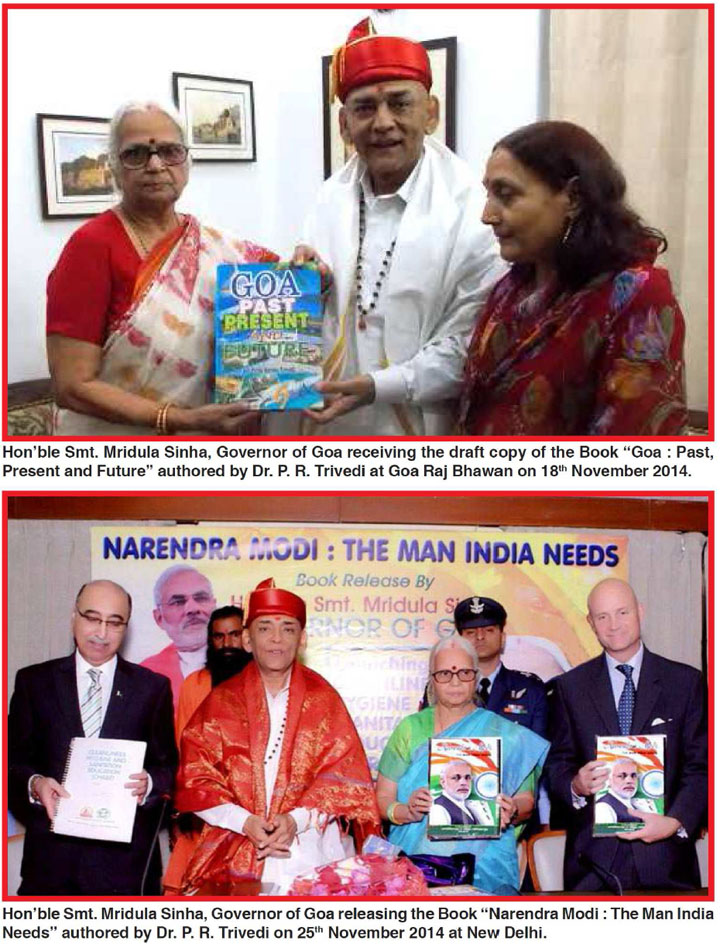
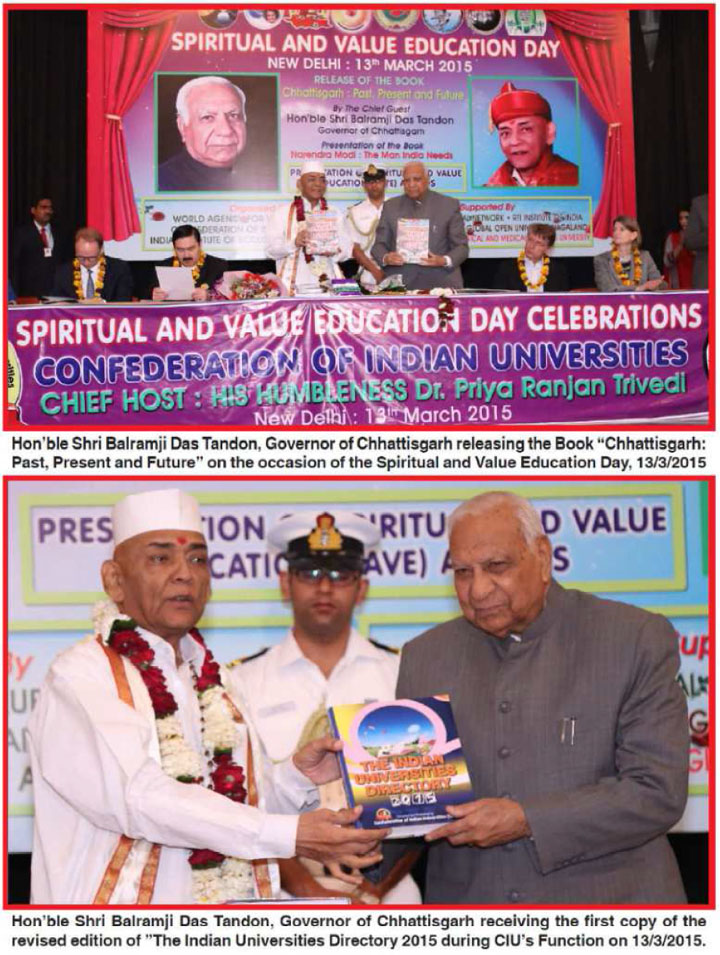
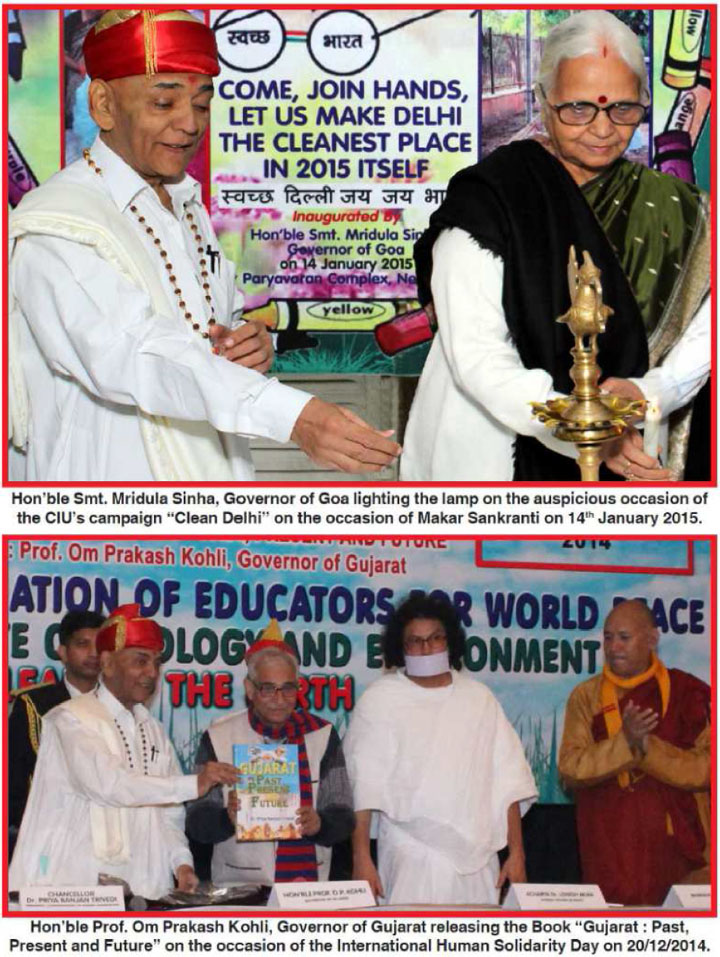
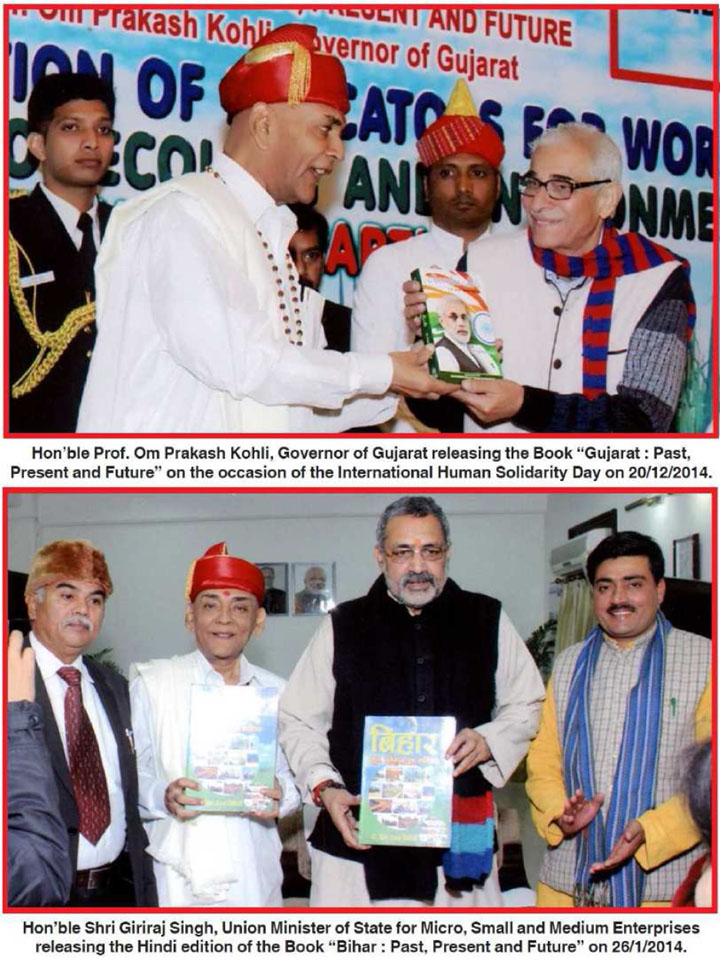
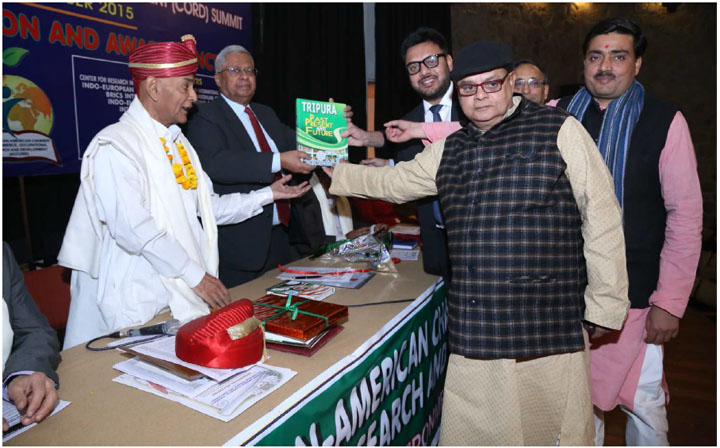
The Hon'ble Governor of Tripura Shri Tathagata Roy releasing the
Book titled "Tripura : Past, Present and Future" on 24 December
2015 at New Delhi.
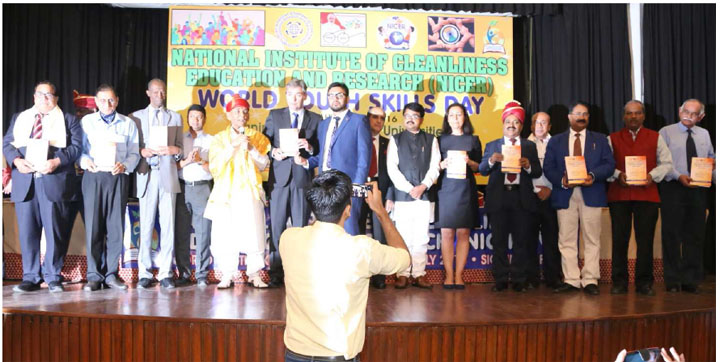
The Vice Chancellors of different Universities from India with
the Ambassadors and High Commissioners observing the World Youth
Skills Day on 15 July 2016 at India International Centre, New
Delhi organized by WAGE and NICER.
During the year 2017, the World Encyclopaedia of Women has been brought out in 45 Volumes by WAGE with the help of the editorial and information support from many organizations.
Finally, she displayed the titles of the World Encyclopaedia of Women's Development running into 50 Volumes as given below :
world encyclopaedia of women's development
Volumewise Details
Volume 1 Women Today
Volume 2 Feminist Theology
Volume 3 Feminine Psychology
Volume 4 History of Feminism
Volume 5 Feminist Theories
Volume 6 Introduction to Women's Studies
Volume 7 Women : Past and Present
Volume 8 Status of Women
Volume 9 Women's Education
Volume 10 Crime Against Women
Volume 11 Violence Against Women
Volume 12 Women : Family, Marriage and Social Operation
Volume 13 Women's Development
Volume 14 Women : Gendering Work, Feminism and Postmodernism
Volume 15 Women's Welfare
Volume 16 Women's Health
Volume 17 Women : Fertility, Contraception and Family Planning
Volume 18 Women's Issues
Volume 19 Policies, Programmes and Commission on Women
Volume 20 Women's Challenges
Volume 21 Contemporary Women's Studies
Volume 22 Women's Empowerment
Volume 23 Women and Entrepreneurship
Volume 24 Women in Politics
Volume 25 Equitable Development for Women
Volume 26 Women in North East India
Volume 27 Gender Sensitisation
Volume 28 Economic Development of Women
Volume 29 Political Socialisation of Women
Volume 30 Indian Women Writing in English
Volume 31 Women and Religion
Volume 32 Exploitation of Women
Volume 33 Women Rights and Duties
Volume 34 Women's Movements in India
Volume 35 Women's Equality and Development
Volume 36 Women and Law
Volume 37 Women and Employment
Volume 38 Women and Social Change
Volume 39 Working Women
Volume 40 Future of Women
Volume 41 Women and Rural Development
Volume 42 Domestic Women Workers
Volume 43 Indian Women and Globalisation
Volume 44 Tribal Women and Society
Volume 45 Women in India
Volume 46 Substance Use Among Women
Volume 47 Women and Advertising
Volume 48 Women and Agriculture
Volume 49 Feminist Economics
Volume 50 Ecofeminism
Price : For the entire Set : Rs. 99,500 only.
The payment of Rupees Ninety Five Thousand Five Hundred only may kindly be made in the name of "Women's Agency for Generating Employment" payable at New Delhi by cheque / draft at the earliest and be sent by Speed Post. Alternatively this amount of Rs. 99,500 may be transferred in our Bank Account having the following details :
Name of the Bank Account : Women's Agency for Generating Employment
Name of the Bank : Indian Bank, Saket Branch, New Delhi - 110017
Bank Account Number : 6491701398
IFC Code : IDIB000S097
Helpline : 011- 40543739, 011-41096948
masterplan paradigm envisaged by wage (2016-2025)
2. To ensure de-jure and de-facto enjoyment of all human rights and fundamental freedom by women on equal basis with men in all spheres - political, economic, social, cultural and civil.
3. To allow equal access to participation and decision making of women in social, political and economic life of the nation.
4. To provide equal access to women to health care, quality education at all levels, career and vocational guidance, employment, equal remuneration, occupational health and safety, social security and public office etc.
5. To strengthen legal systems aimed at elimination of all forms and types of discrimination against women.
6. To change the societal attitudes and community practices by active participation and involvement of both men and women.
7. To mainstream a gender perspective in the development process.
8. To eliminate the discrimination and all forms of violence against women and the girl child.
9. To build and strengthen partnerships with civil society, particularly women's organizations.
10. To develop gender development indices, by networking with specialized agencies.
11. To undertake gender auditing and development of evaluation mechanisms.
12. To undertake the collection of gender-disaggregated data by all primary data collecting agencies of the Central and State Governments as well as research and academic institutions in the Public and Private Sectors.
13. To design an alternative strategy of development comprising a frontal attack on poverty, unemployment and malnutrition.
14. To provide access to, and to take benefits from, the public health system that have been very uneven between the better-endowed and the more vulnerable sections of society.
15. To endorse the policy that a diverse developing society such as ours provides numerous challenges in the economic, social, political, cultural, and environmental arenas. All of these coalesce in the dominant imperative of alleviation of mass poverty, reckoned in the multiple dimensions of livelihood security, health care, education, empowerment of the disadvantaged, and elimination of gender disparities.
16. To provide universal access and enrolment of the girl child.
17. To provide universal retention of the girl children up to14 years of age.
18. To ensure a substantial improvement in the quality of girl education to enable all the girl children to achieve essential levels of learning.
19. To advise all nations to understand that they should be judged by the well-being of their female population and through the levels of health, nutrition and education; by the civil and political liberties enjoyed by their female citizens; by the protection guaranteed to female children and by provisions made for the vulnerable and the disadvantaged.
20. To have an understanding that the women in India constitute about 595 million representing 48 percent of the total population.
21. To ensure that such a high percent of valuable human resource do not face disparities in access to and control over resources and constitute as one the most vulnerable and marginalized.
22. To ensure that women's risk of premature death and disability do not take place as it is highest during their reproductive years. Maternal mortality is not merely a health disadvantage, it is a matter of social injustice.
23. To improve the status of female as low social and economic status of girls and women limits their access to education, good nutrition, as well as money to pay for health care and family planning services.
24. To empower women and enhance their employment opportunities through the participation of women in the paid work force.
25. To promote a gender sensitive, multi-sectoral agenda for population stabilisation, that will think, plan and act locally, and support nationally.
26. To ensure under-nutrition and micronutrient deficiency do not take place as it goes beyond mere food entitlements to woman's well-being. To the extent that women are over-represented among the poor, interventions for improving women's health and nutrition are critical for poverty reduction.
27. To remove the poor female literacy rate, and gender based inequality, social discrimination and economic exploitation, occupation of girl child in domestic chores, and improve low enrolment of girls in schools, and low retention rate and high dropout rate etc.
28. Therefore, the main strategies should be for increasing female literacy in the country including providing and imparting functional literacy, universalization for elementary education and non-formal education.
29. To strengthen the cause of National Literacy Mission or Sakshar Bharat Mission, with its objective of extending educational options to those adults who have no access to formal education, targeted female literacy as a critical instrument for women's empowerment.
30. And to generally do all that is required and is conducive to the overall development of women.
Silver Jubilee Celebrations of the Women's Agency for Generating Employment (WAGE) observed on 8th March 2015 at New Delhi
The following monographs were presented and discussed between 8th March 2015 and 8th March 2016 :
1. Feminist Archaeology
2. Gender Archaeology,
3. Feminism and Architecture
4. Feminist Art Movement
5. Feminism Atheist
7. Female Bonding
11. Women's Cinema
12. Women in Computing
14. Gender Differences
15. Discrimination
16. Distinction, Sex and Gender
18. Cult of Domesticity
19. Ecofeminism
20. Feminist Economics
21. Female Education
22. Feminist Egalitarianism
23. Women in Engineering
24. Gender Neutrality in English
26. Feminist Political Ecology
27. Feminist Revisionist Mythology
28. Gender and Crime
30. Gender Binary
32. Gender Equality
33. Gender Performativity
34. Gender Sociology
35. Girl Power
36. History of Women in the Military
37. Sexual Harassment
38. Gender Identity
39. Islamic Feminism
40. Feminism in India
41. Women in Journalism and Media Professions
42. Liberal Feminism
43. Legal Rights of Women
44. Gender Mainstreaming
45. Women in Medicine
46. Feminist Movement
47. Radical Feminism
48. Reproductive Justice
49. Separatist Feminism
50. Sociology of Motherhood
51. Feminist Therapy
52. Third-Wave Feminism
53. Violence Against Women
54. Waves of Feminism
55. Womanism
56. Women's Health
57. Women and Skill Development
58. Women and Politics
59. Women and Social Service
60. Women and Entrepreneurship
Further information and Contact :
Women's Agency for Generating Employment (WAGE)
A 42-43, Paryavaran Complex, South of Saket
New Delhi - 110030
Tel.: 011-40543739
Email : [email protected]
The following monographs were presented and discussed
between 8th March 2015 and 8th March 2016 :
1. Feminist Archaeology
2. Gender Archaeology,
3. Feminism and Architecture
4. Feminist Art Movement
5. Feminism Atheist
6. Black Feminism
7. Female Bonding
8. Bride Burning
9. Bride Kidnapping
10. Christian Feminism
11. Women's Cinema
12. Women in Computing
13. Difference Feminism
14. Gender Differences
15. Discrimination
16. Distinction, Sex and Gender
17. Domestic Violence
18. Cult of Domesticity
19. Ecofeminism
20. Feminist Economics
21. Female Education
22. Feminist Egalitarianism
23. Women in Engineering
24. Gender Neutrality in English
25. Feminist Philosophy
26. Feminist Political Ecology
27. Feminist Revisionist Mythology
28. Gender and Crime
29. Gender Archaeology
30. Gender Binary
31. Gender Differences
32. Gender Equality
33. Gender Performativity
34. Gender Sociology
35. Girl Power
36. History of Women in the Military
37. Sexual Harassment
38. Gender Identity
39. Islamic Feminism
40. Feminism in India
41. Women in Journalism and Media Professions
42. Liberal Feminism
43. Legal Rights of Women
44. Gender Mainstreaming
45. Women in Medicine
46. Feminist Movement
47. Radical Feminism
48. Reproductive Justice
49. Separatist Feminism
50. Sociology of Motherhood
51. Feminist Therapy
52. Third-Wave Feminism
53. Violence Against Women
54. Waves of Feminism
55. Womanism
56. Women's Health
57. Women and Skill Development
58. Women and Politics
59. Women and Social Service
60. Women and Entrepreneurship
Further information and Contact :
Dr. Tanuja Trivedi, Director
Women's Agency for Generating Employment (WAGE)
A 42-43, Paryavaran Complex, South of Saket
New Delhi - 110030
Tel.: 011-40543739, 011-41096948
Email :
[email protected]
|
50 Volume World Encyclopaedia of Women's Development
Accordingly a cheque for Rs. 95,500 may be sent in the name of "Women's Agency for Generating Employment" payable at New Delhi and to reach the Headquarters at A 42-43, Paryavaran Complex, South of Saket, New Delhi - 110030. |
|
24 Volume World
Encyclopaedia of Nanoscience and Nanotechnology
|
..